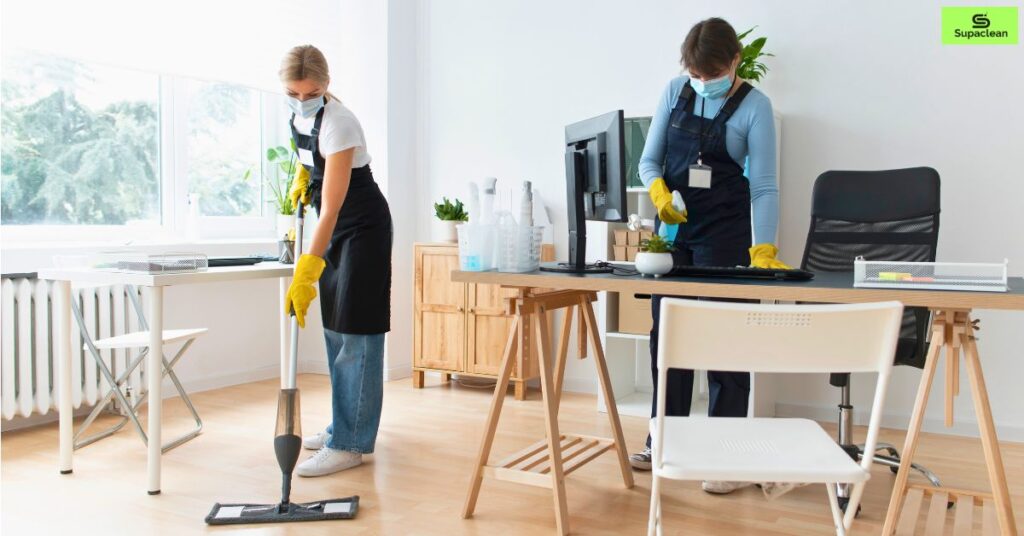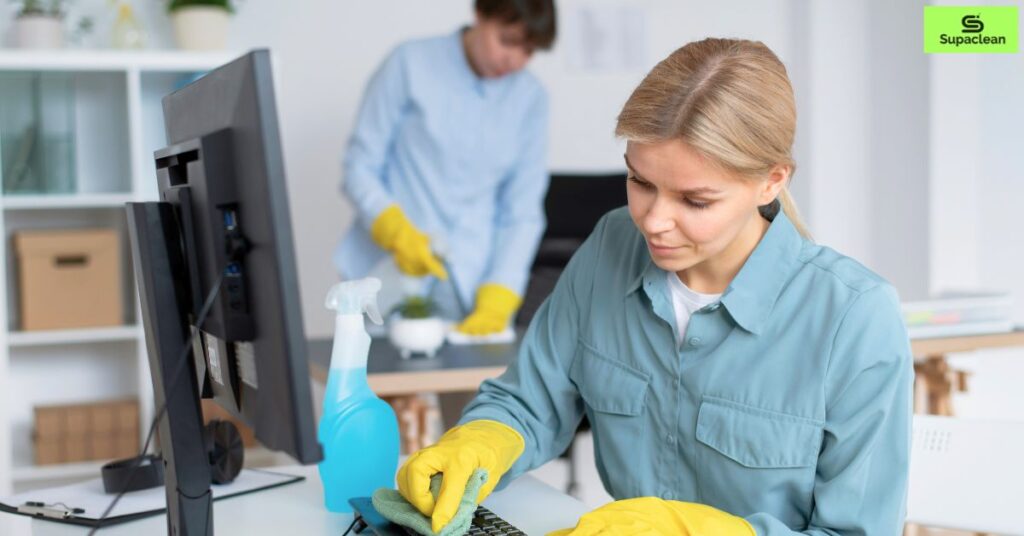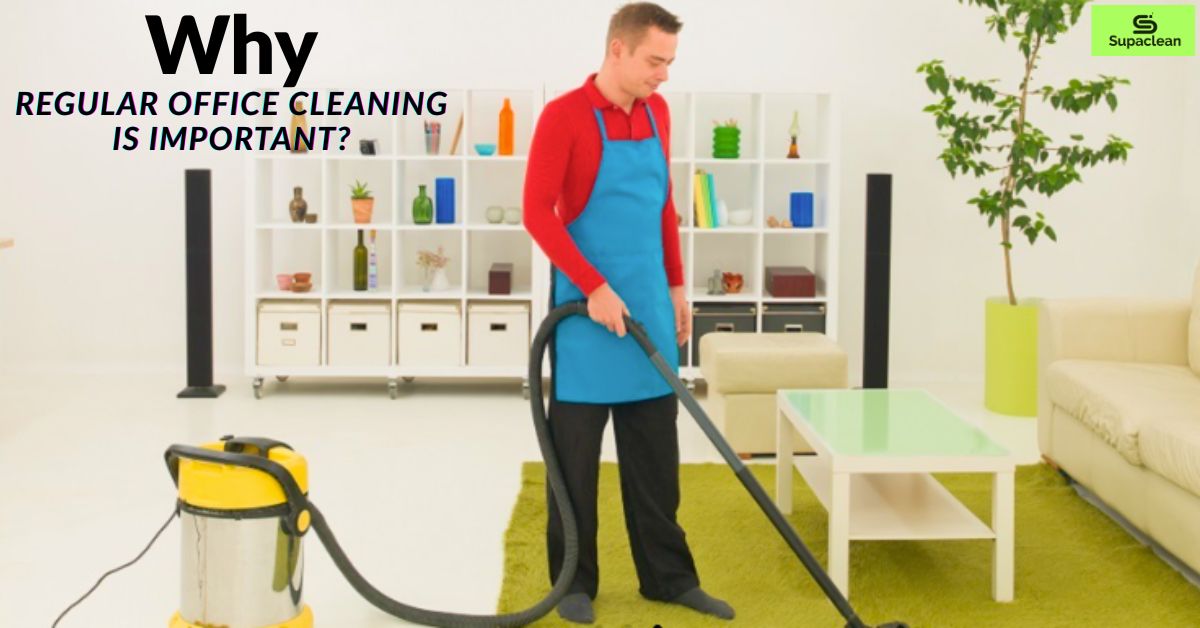Introduction: More Than Just a Tidy Desk
Imagine an average Monday morning in your office: staff file in, someone boils the kettle in the communal kitchen, while a few crumbs from last week’s pastries remain on desks. It may not seem significant at first, but small neglects, such as unattended bins, dusty vents, and unclean kitchen areas, can have a surprisingly large impact on how employees feel, perform, and ultimately, how much work gets done.
This is far from trivial. Evidence suggests that unnecessary sick leave, low productivity, and poor workplace morale are all linked to the work environment. In this context, regular office cleaning is not a luxury; it’s a business imperative. It’s about protecting health, boosting performance, and aligning with legal responsibilities, especially within the UK regulatory framework.
In this article, we explore why regular commercial office cleaning services should be a top priority for UK businesses, covering health benefits, productivity gains, legal compliance, practical implementation, and the business case for investing in cleanliness.
1. Health at Work: Keeping Germs and Absence at Bay
Offices are high-traffic environments, with multiple staff using phones, keyboards, kitchen areas, and meeting rooms daily. These high-touch surfaces are ideal transmission points for viruses, bacteria and allergens. Without regular cleaning services or regimen, pathogens can linger on surfaces for hours or even days.

In the UK, common colds, flu and other respiratory illnesses contribute significantly to sick leave. Though exact numbers vary by season, absenteeism due to minor illnesses still adds up, both in staff wellbeing and business costs.
Reducing Sick Days and Improving Wellbeing
A systematic, daily office cleaning services schedule, covering desks, communal areas, washrooms, and kitchens, can significantly reduce the germ load in an office. This translates to:
- Fewer sick days, since germs and allergens are less likely to linger and reinfect staff.
- Improved staff wellbeing, with fewer irritations from dust, allergens or unpleasant odours.
- Better first impressions, helping maintain a sense that the workplace cares about staff health.
- A proactive hygiene approach encourages a culture of health consciousness, where even staff can take small steps like wiping down keyboards or responsibly disposing of food waste.
2. Productivity and Morale: The Clean Office Effect
There is a well-established psychological link between environment and mental focus. A cluttered physical environment can contribute to distraction, clutter in the mind, and increased cognitive load. In contrast, a clean, organised workspace reduces visual noise, fosters clarity of thought, and creates an environment where people feel comfortable and motivated to work.

For UK workplaces increasingly emphasising employee wellbeing and mental health, such as flexible working, remote or hybrid models, and wellbeing policies, the physical workplace remains core to how staff feel when they come in. A pleasant, clean environment signals care, professionalism and respect.
Team Morale and Company Image
A well-maintained office doesn’t just benefit individual employees, but it also shapes the collective team culture. Staff take pride in well-kept common areas, clean break-out spaces, and tidy meeting rooms. It promotes a sense of mutual respect for shared property and co-workers, reinforcing positive workplace behaviours.
Furthermore, when clients, partners or potential recruits visit your premises, whether in London, Manchester, Birmingham or beyond, a clean and fresh office makes a strong first impression. It communicates professionalism and brand care, and can actively contribute to business reputation and credibility.
3. Employer Responsibility in the UK: Legal and Moral Duty
In the UK, employers have legal obligations when it comes to maintaining workplace health, safety and welfare. Under the Health and Safety at Work etc. Act 1974, employers are required to ensure, so far as is reasonably practicable, that employees’ health, safety and welfare are maintained while at work (source)
The Workplace (Health, Safety and Welfare) Regulations 1992 (source) go further, placing a statutory requirement that workplaces, including offices, must be kept sufficiently clean, and that surfaces, floors, walls, traffic routes and general housekeeping are maintained properly, with waste removed and spillages cleaned up promptly (source).

These regulations also extend to any non-domestic premises and shared areas under the control of the employer.
Failure to maintain adequate cleanliness can expose a business to legal risks, regulatory scrutiny, and ultimately potential fines or reputational damage. While Approved Codes of Practice provide practical guidelines, the core legal duties remain mandatory.
Beyond Legality: Ethical Duty and Staff Trust
The legal obligations provide a baseline. But there’s also a moral and ethical dimension: creating a workspace where people want to come to work, feel respected, and see genuine care for their well-being. The cleanliness of facilities, from washrooms and kitchens to desks, speaks directly to the employer-employee relationship.
Additionally, if your premises host visitors such as contractors, clients or members of the public, the duty of care extends beyond employees alone.
I recommend getting your commercial office cleaning done with experts & DBS-checked cleaners just like SupaClean, who have trained staff to support all your cleaning needs in Wakefield, Leeds, Bradford, and nearby areas.
4. Practical Steps for UK Offices: Building a Cleaning Regime That Works
Now that the why is clear, let’s dive into the how. A practical, UK-focused cleaning strategy should align with both business needs and operational realities.
4.1 Define a Cleaning Schedule Based on Usage and Risk
Not all areas require the same cleaning frequency. A useful approach is to classify areas by footfall and usage:
A. Daily tasks:
- Desks and workstations: wipe down keyboards, desk surfaces (especially high-touch points).
- Communal areas: kitchens, break-out spaces, kettle or coffee zones, bins emptied, communal bins cleaned.
- Washrooms: ensure soap, toilet paper, paper towels or hand-dryers, and the space is cleaned and stocked.
Guidance for employers on welfare provisions: https://www.hse.gov.uk/pubns/indg293.PDF
B. Weekly or bi-weekly deep cleaning:
- Meeting rooms: dusting, vacuuming, furniture wiping, ensuring spaces are reset and fresh.
- Carpets and flooring: vacuum, spot-treat stains, and perform deeper cleaning periodically to prevent wear and tear and preserve lifespan.
- Ventilation points and vents: clean dust buildup and ensure good airflow and air quality.
C. Periodic inspections:
Regularly walk through the office, monthly or quarterly, to assess whether the commercial office cleaning services standards are being met, whether additional focus areas need resourcing, or if spillages or clutter are becoming issues.
4.2 Determine In-House vs. Professional Office Cleaning Services
Depending on office size, location, and workforce demands, different businesses may choose:
A. In-house cleaning staff:
- Suitable for smaller to medium offices where a dedicated person or small team can manage consistent daily tasks.
- Offers more control over timing and immediate responsiveness.
B. Outsourcing to professional office cleaning services:
- Particularly beneficial for larger offices, multi-site operations, or where professional standards, training, insurance and compliance are priorities.
- A reputable cleaner for office cleaning will manage training, health and safety compliance, insurance for staff, and can scale services according to demand.
- Many firms offer tailored service packages just like SupaClean, from routine scheduled office cleaning services to deep cleansing, carpet maintenance and sanitation specialities.
4.3 Create a Clear Cleaning Policy and Communication
A documented approach helps set expectations for employees, managers, and janitorial services:
- Cleaning schedule and roles: who is responsible for what; whether staff are expected to keep personal workstations tidy; how to report spillages or issues.
- Health and safety procedures: ensure spillages are cleaned promptly, and hazards such as wet floors are clearly signposted to prevent slips and trips.
- Use appropriate products and PPE: cleaning staff (internal or janitorial services) should use correct cleaning agents, protective gear if required, and adhere to COSHH (Control of Substances Hazardous to Health) standards if janitorial services or commercial cleaning services are involved (source).
- Feedback loops: invite employees to report concerns or suggestions, e.g., if a communal area is repeatedly messy, if bins overflow, or if there are odours or hygiene issues.
4.4 Maintain Monitoring and Continuous Improvement
- Inspection checklists: establish standard cleaning checklists, possibly supported by photographic evidence or periodic audits.
- Monthly reviews: discuss whether cleaning frequency remains suitable, whether additional services (like deep carpet cleaning or ventilation duct cleaning) are needed, and update the commercial office cleaning providers or in-house roster accordingly.
- Engagement and ownership: encourage all employees to take small ongoing ownership, a clean desk policy, prompt disposal of food waste, wiping their own workpoint at day’s end, and recognising that cleanliness is a shared responsibility.
Conclusion: Investing in Cleanliness Is Investing in People and Performance
Regular commercial office cleaning services stand at the intersection of employee health, productivity, legal compliance, and operational value. For UK businesses, it’s about more than ticking a box; it’s about creating an environment where staff feel safe, motivated, and proud of their workplace, and where clients and visitors consistently experience professionalism and care.
If you’d like, SupaClean can support you with a tailored audit, setting up cleaning schedules, or providing a DBS-checked cleaner for office cleaning with compliance oversight and professional standards. Let’s create a clean, healthy, and productive workplace together. Learn More: https://supa-clean.uk/our-services/

